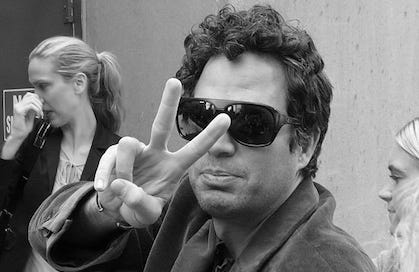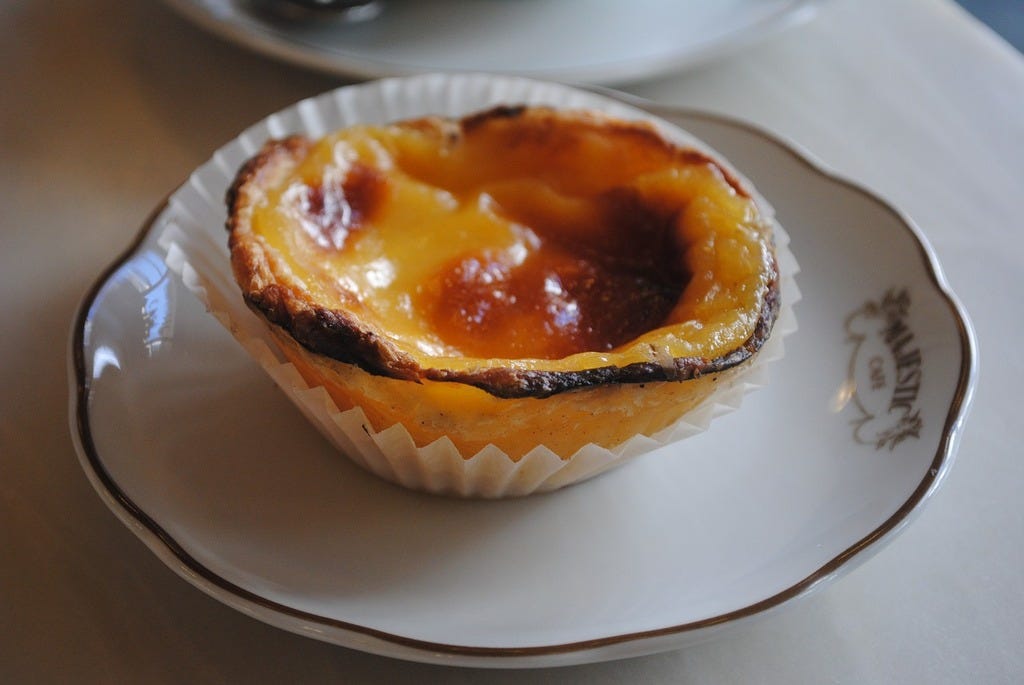Mark Ruffalo Bought a Tart
Four nominations and not a single win. How Mark Ruffalo's reputation as a 'great guy' might be standing in the way of Oscars glory.
Last night I watched the Oscars, which, let’s face it, was pretty dry compared to 2022’s ceremony which gave us The Slap, followed by Will Smith’s acceptance speech where he managed to push out so many tears I felt sorry for the guy, if only for a second. Somehow, we were clapping for the slapper and not the slapped, Chris Rock. Now, that was a show.
I don’t mean to say that yesterday evening was without its ‘Oscars moments’. There were several. Da’Vine Joy Randolph brought Tinseltown to tears with a heartfelt speech about self-love, a nude JAAAHN CENA!!!! revealed his teeny tiny legs (in comparison to his monstrous torso), Jonathan Glazer condemned violence in Gaza and Israel, Ryan Gosling was indeed Ken, Emma Stone seemed genuinely humbled to win a second Oscar that many thought was destined for Lily Gladstone, and the immensely likeable Mark Ruffalo was there too, with front row seats.
He had earned his fourth Best Supporting Actor nomination for his performance in Poor Things (2023) as Duncan Wedderburn: a pathetic, bitter, misogynistic man-child, effing and blinding his way through the film with such bravado I actually pitied him. More so than Will Smith even. Ruffalo’s Wedderburn was a comedic masterclass deserving of the Oscar that had already been earmarked for Robert Downey Jr., who, no matter how well he can act, will always be remembered as the 90s greatest cokehead, Jimmy Kimmel unsubtly pointed out in his otherwise insipid monologue. Was Kimmel trying to get slapped? I certainly hoped so.
Anyway, unslappable Mark Ruffalo was great in Poor Things. He’s an all-around great guy. That seems to be the general consensus; I think someone even mentioned what a bloomin’ great guy he was in their acceptance speech. Ruffalo stood with his co-star Ramy Youssef, Riz Ahmed, Billie Eilish, and other artists who wore red pins to call for an immediate ceasefire and the safe release of hostages in Gaza. He even made the peace sign, raised a fist, and declared: “The Palestinian protest shut down the Oscars tonight. Humanity wins.” A true champion of the people. I can’t knock him. Even if he does sound pompous when ordering a Portuguese tart.
Let me explain. Over a year ago, well before the release of Poor Things, I was lucky enough to be sat in a Hampstead deli, chowing down on a saltbeef bagel when the Mr. Mark Ruffalo walked in, smiled at the cute waitress who knew exactly who he was, and ordered a Portuguese tart, when everyone who’s anyone knows it’s a pastel de nata (c’mon Mark).
“Could I get a… Portuguese tart?” He asked politely in his American accent, lingering on the “a”, then really enunciating the first “t” of “tart”, flicking his tongue into the roof of his mouth in one clean strike.
Just the takeaway tart, no coffee, no tea. His order was quickly seared into my memory as I recounted the anecdote to friends and family, the latest of my celeb sightings in the leafy hilltops of Hampstead. The previous week, I had waited to cross the street next to Ricky Gervais. Not long before then, I had discovered that Helena Bonham Carter and I frequented the same specialty coffee spot. But this felt bigger. Mark “The Hulk” Ruffalo, a true Hollywood heavy-hitter. Not quite Will Smith-famous, but close enough.
The pastel moment came full circle when I went to see Poor Things in January. In the scene where Ruffalo’s Duncan Wedderburn and Stone’s Bella Baxter arrive in a dreamlike Lisbon, he teaches her how to eat a tart: “They must not be eaten dainty flake by dainty flake but inhaled with gusto, like life itself.” Wedderburn then proceeds to scoff down an entire tart whole. Baxter does the same, before they return for more “furious jumping” in the hotel room.
On my lunch break, I had bore witness to Ruffalo’s commitment to the creative process. His Portuguese tart was more than a mere afternoon treat. It was research for the role, dedication to the craft. Like fellow nominee and two-time Academy Award-winner Robert DeNiro, who gained 60 pounds to play an ageing Jake LaMotta in Raging Bull (1980), Ruffalo was prepared to eat for the sake of art. I wonder how he ate the tart I saw him buy (a tart that could have just as easily been mine—I got there first). Did he eat it whole like in the script or bite by bite? Did he take it to the Heath and eat it on a bench or shove its stodgy egginess down his gullet in a secluded alleyway? Did he use a napkin or his tongue to clean the crumbs from the stubbly corners of his mouth? I guess I’ll never know.
Unlike Emma Stone, who candidly revealed all the juicy details about just how many pastéis de nata she ate on set (it was 60), Ruffalo went about his business quietly, moving amongst the rest of us, keeping that sort of information to himself. Maybe he too should have been more forthcoming about his pastel-eating achievements. It could have won him that Oscar.





Love the flow of the story!
Brilliant as always!